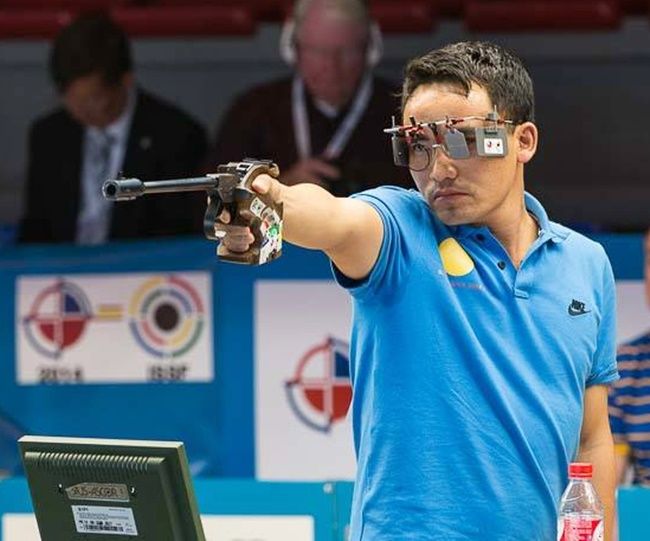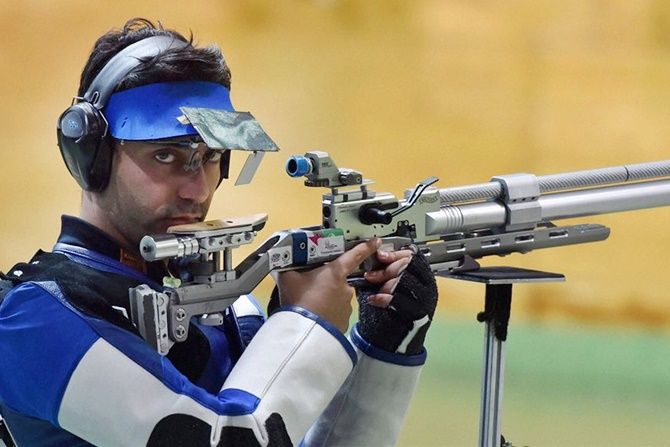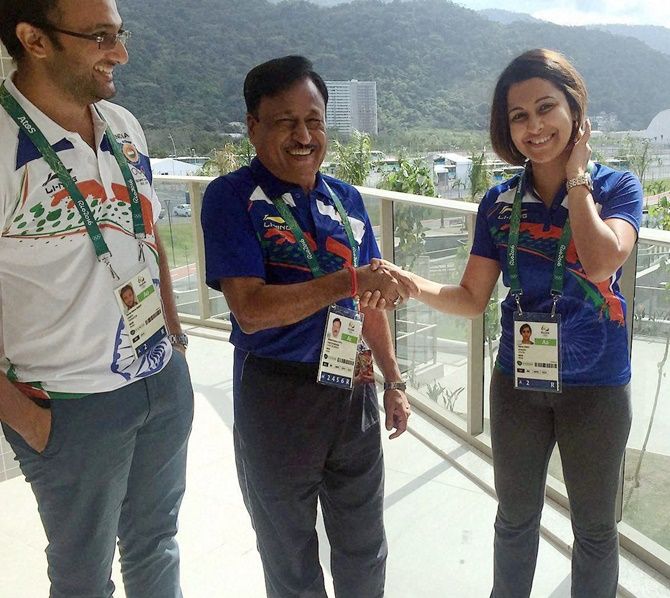Bindra, Jitu have emerged as the brightest hope

A star-studded Indian shooting contingent will begin their Rio Olympics campaign on Saturday with in-form Jitu Rai hoping to launch the country's medal haul in an event which will also see his more illustrious senior colleague Abhinav Bindra aiming to end his glorious career on a high.
Success in shooting will be key to India's hopes of surpassing London Olympics' six-medal haul, and the performance of Jitu and Bindra would be crucial to achieve that aim, while the likes of Gagan Narang, Manavjit Singh Sandhu, Heena Sidhu and Apurvi Chandela can also fetch India medals.
Shooters don't like to make noise outside the range and they go about in a low key manner which has been their trademark, and Bindra's innocuous tweet 15 days ago that he would be incommunicado with the outside world till his fifth and last Olympics campaign begins sums up the mood in the shooting camp.
Tipped to give India their second individual gold medal after Bindra, armyman Jitu has emerged as the brightest hope and he opens his campaign in his pet 10m air pistol event at the Olympic Shooting Centre.
The pistol shooter, born in Sankhuwasabha district of Nepal and settled in Uttar Pradesh, is the reigning world champion in 50m pistol as he will compete in both the events with an aim to make an unprecedented double in the Olympics.
Having won medals at the Asian Games (gold and bronze in Incheon 2014), Commonwealth Games (gold in Glasgow 2014), World Cup (two gold, three silver and one bronze) and World Championships (silver in Granada 2014), the 'village lad' Jitu has made rapid strikes since the last Olympics.
"I did not know what was an Olympics. I come from a village and like to stay that away," Jitu, the latest product from the Army Marksmanship Unit, has said.

If Jitu is making his Olympics debut, Bindra will perhaps be in his last and fifth Summer Games and he would like to bow out on a high.
Four years after setting up the gold standard in Beijing, Bindra crashed to a 16th place finish in 2012 London, but this time the shooter from Zirakpur, who is known to pay minute attention to details, has created Rio-like settings at his home.
"Shooting as a sport is all about perfection. The only way you can achieve success is by eliminating all the variables. Some you foresee and some you just cannot. In a sport like shooting, winning doesn't come easily. You have to suffer. You can't go in thinking you will return with a medal. It just doesn't work that way," said Bindra in the book 'My Olympic Journey'.
Having inspired a generation of young shooters, it will be in the fitness of things if the 32-year-old Bindra signs off on a high.
Day one of shooting will also see 10m air rifle women duo of Apurvi Chandela and Ayonika Paul, who had won gold and silver respectively at the 2014 Commonwealth Games in Glasgow, opening their campaigns.
Apurvi took up to shooting after seeing Bindra's gold medal feat in 2008 and now competing alongside her role model, the Delhi girl hopes to make a mark along with Mumbai's Ayonika.

Heena Sidhu is the third female member of the shooting contingent and the first pistol shooter to be ranked number one in the ISSF world rankings of 2014 and the same year, she also won a World Cup silver.
Heena, who missed the 10m final in London four years ago, would look to make amends.
The 25m rapid-fire pistol event had earned India a silver in London courtesy Vijay Kumar who has failed to qualify this time. But in his absence, Gurpreet Singh promises to make a mark. Both the Armymen have the same coach Pavel Smirnov.
The Punjab lad will be shooting in 10m and 25m rapid-fire events and his promising performance at Munich world Cup last year where he finished fourth in both the events makes him one to watch out for.
After the silver medal in Athens 2004 by Rajyavardhan Singh Rathore, shot gun shooters have drawn a blank but this could be the year when the trio of veteran Manavjit Singh Sandhu, youngster Kynan Chenai (trap), Mairaj Ahmed Khan (skeet) will be keen to make a mark.
At 40, Manavjit is the senior most member of the side and he is a six-time Asian champion, Asian Games silver medallist and two-time World Cup gold medallist.
The shooting revolution began in Athens 2004 when Rajyavardhan Singh Rathore clinched the double trap silver, and in the next edition in Beijing, Bindra made gold a reality for the first time since India's dominance in hockey.
Their success has spawned hopes all over the country as shooting now has taken the place of hockey as far as medal prospect is concerned.











